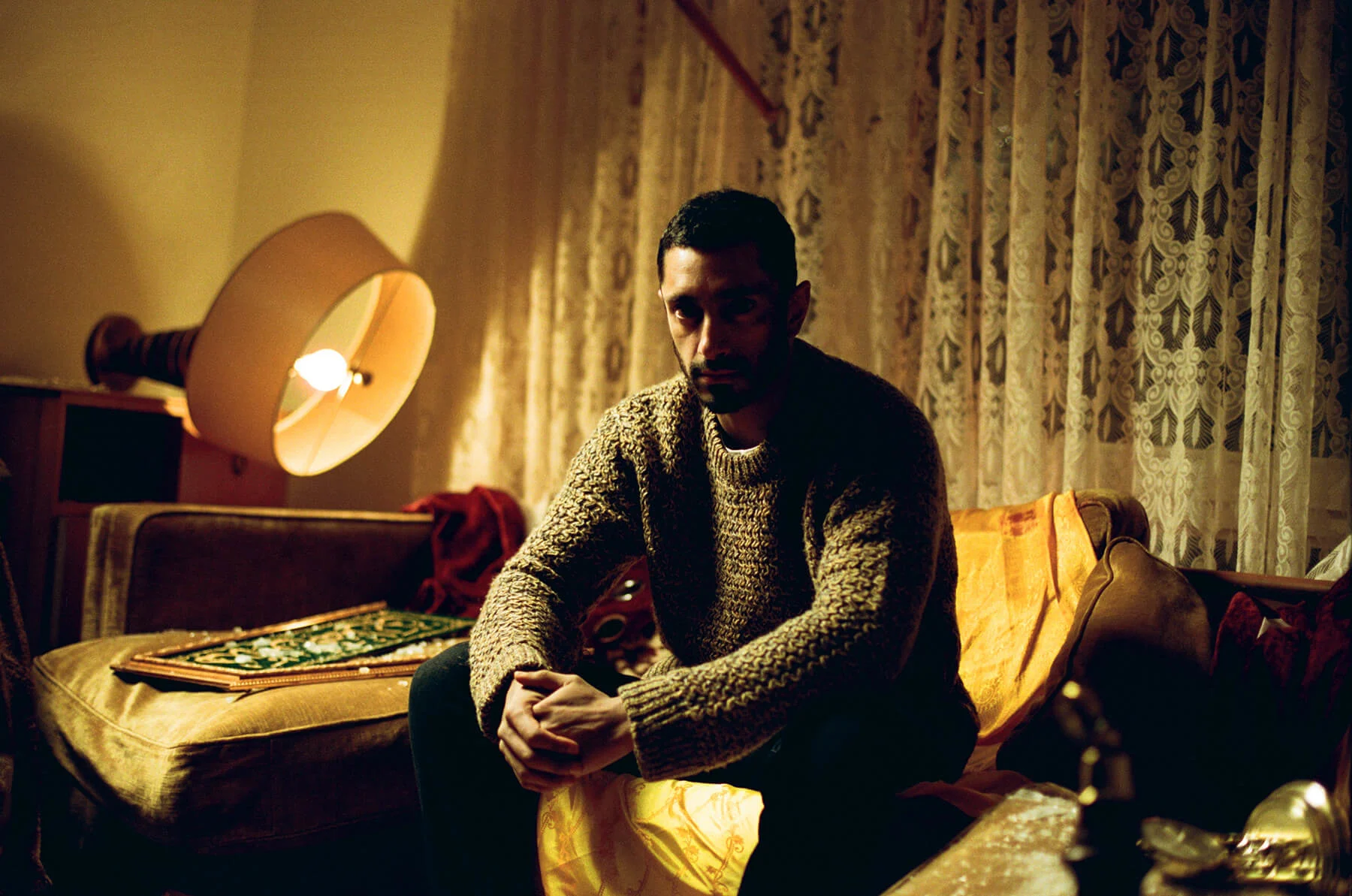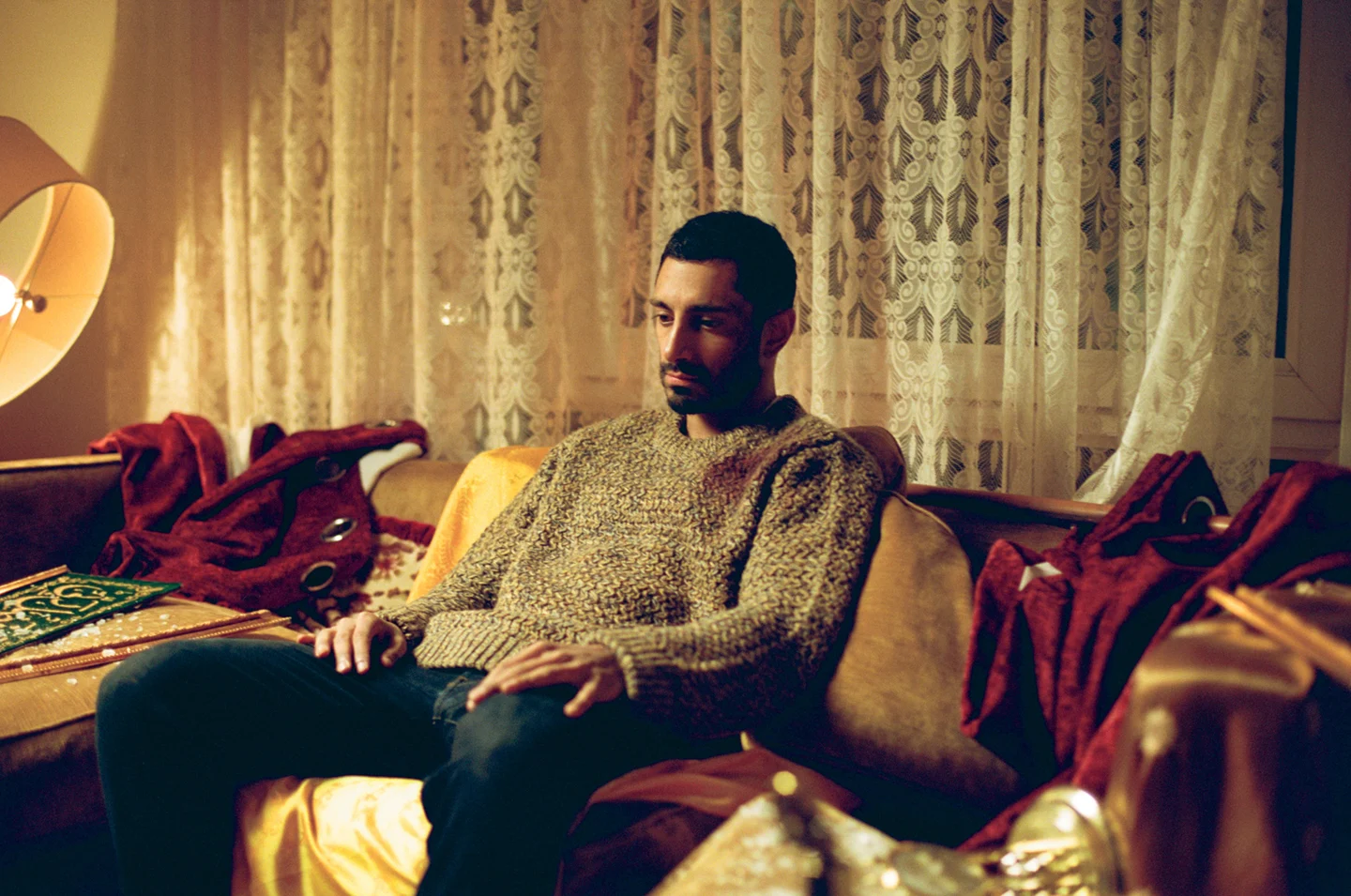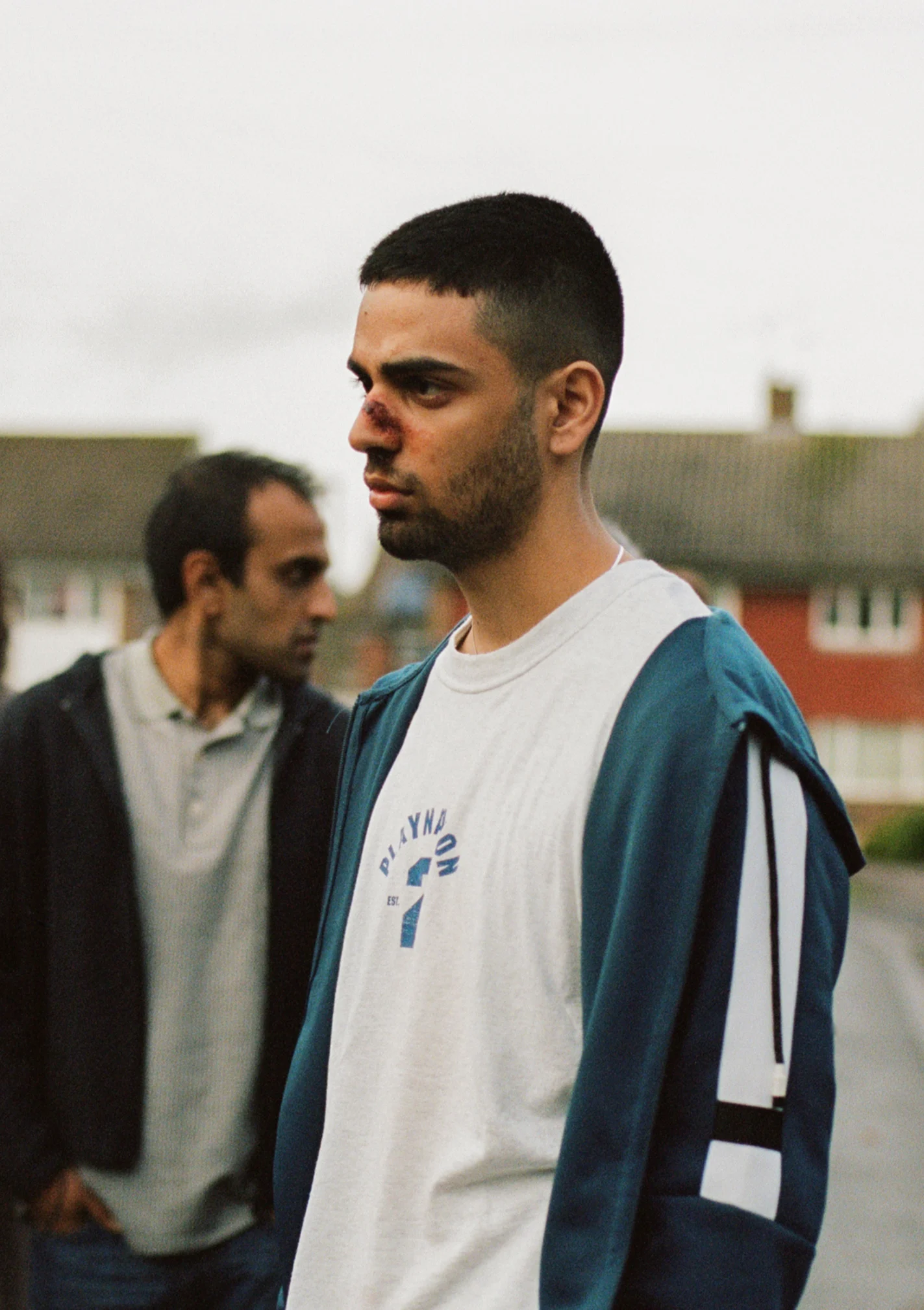


Riz Ahmed and Aneil Karia imagine a dystopian but not impossible future
Actor, musician and activist Riz Ahmed has never been afraid to speak his mind. Whether in the roles he chooses or giving impassioned speeches in parliament, his work is reflective of what is happening in the world today. Now to coincide with the release of his new album, The Long Goodbye, Riz is releasing a new short film of the same name, as part of a collaboration with WePresent and directed by Aneil Karia. A sobering and powerful watch, The Long Goodbye imagines a dystopian near future and sees Riz unpack his feelings towards his country. Here, Charlie Brinkhurst-Cuff goes behind the scenes with Riz and Aneil during filming.
Behind the scenes photos by Vicky Grout.
This film contains sensitive material, viewer discretion is advised.
Stumbling through a thicket in what feels like a remote part of the countryside, I emerge, unsteady-footed, onto an immaculately manicured lawn. I’m staring up at a huge, white house, surrounded by a picket fence. Jammed deep into the soil is a blue sign, reading “Vote Conservatives.” It could be a scene from Jordan Peele’s Get Out. In reality, I’m in Surrey, on my way to the shoot of actor-musician Riz Ahmed’s latest short film project, The Long Goodbye. I’m soon to find out that my initial reaction to the location is fitting.
With The Long Goodbye Riz, alongside director Aneil Karia (Top Boy), have created what all good dystopian creators set out to do: a vision of the future that doesn’t seem so far away; one that is perhaps already here. As argued by academic Dr Ruzbeh Babaee, “It is in the essence of dystopian fiction to make the reader aware of the truth and reality of their life, a call to wake us up from the lies and unreal aspects of our life.” In this alternate universe, we’re provided with an uncompromising and haunting view of what might lie ahead. The film, starring Riz and both inspired and soundtracked by his upcoming album of the same name, depicts a British South Asian family in the throes of everyday life, who are then violently dragged into the street and packed away into a black van, guns pointed at their heads.

“Not to talk in platitudes, or say really obvious stuff, but I think it's fucking terrifying where we're at. It makes me sad, angry and really scared,” says Aneil. We’re settling down to do an interview in the house-turned-set destroyed by the thugs. His tone is serious. Riz, who has just finished his final scene of the day, and who still seems slightly distant, extricating himself from the mind of his character, takes a while to gather himself. A few moments later, he agrees. “It feels clear to me that this does very much feel grounded in reality, the reality of people's fears, the reality of where we're at. What we've seen today goes through my head every day. It goes through the heads of all of my loved ones every day, and the heads of all of my friends who find themselves in a similar position of being broken up with by the country they live in.”
It feels clear to me that this does very much feel grounded in reality, the reality of people’s fears, the reality of where we’re at.
The Long Goodbye was released just weeks before national shutdowns and stay-at-home orders were issued around the world. The album was always intended to be a multimedia experience, with Riz starring in a startling short film to accompany its release, and when he planned internationals dates to support the record (including commissions at Manchester International Festival and the Brooklyn Academy of Music), he planned to add a “narrative, theatrical element” to the usual live show. But when the UK went into lockdown three days before the shows, he was forced to cancel, and instead supported the album with a series of online discussions under the name The Long Lockdown, which included a watchalong of the 2010 film Four Lions (which Riz starred in) and panels with writers like Rupi Kaur, Nikesh Shukla, and Fatima Bhutto. This unusual album campaign resonated with people, and when Riz found himself in California recently for a new film project, he set about finding a new show to stage as a way to close out the year. In the context of mass job losses caused by the economic fallout of the pandemic, he and his creative team decided to charge for the stream on a pay-what-you-want basis.

For a lot of us who live in diaspora, it feels like a breakup, it feels like being dumped
In the ‘90s, Jamaican council-worker Joy Gardner died in front of her young son in a botched deportation which saw her shackled and tied up with meters of tape. In 2013, Jimmy Mubenga was killed by guards during a deportation flight to Angola. While the masked thugs in The Long Goodbye might be more reflective of the far-right, they should also bring to mind our government, who are still detaining and deporting essentially innocent people under the auspices of our flawed immigration system. Beyond Britain, all over the world, there is persecution on the basis of skin colour, religion and faith.
For Asha Ung, whose son Leon plays a young boy in the film who dances and jokes around with Riz before being dragged off by the thugs, kicking and screaming, the project has got her thinking about her own family history. “My husband’s a Cambodian refugee who came to this country in 1979. He was only a year old at the time,” she tells me, shortly after we grab lunch midway through the day. “They escaped Pol Pot’s regime and were in a refugee camp. Recently we found out that a British cargo ship saved him from this boat full of a thousand people.” Leon knows the story too. “The boat was about to sink, my dad nearly fell off at one point, when he was a baby, but then one of his uncles caught him!” he says, brightly. “Then the cargo ship came and saved them. If it didn’t, then they definitely would’ve sunk.”

For everyone involved, this project clearly isn’t just about politics. Riz’s new work is a reflexive dive into his emotions, an ode to diasporas present and past who have felt isolated and uncertain in the face of blossoming hatred, wherever they are in the world. The music tells a rough, grinding story of his relationship with “Brittney” (Britain), his abusive, exploitative girlfriend who came to visit him “unannounced an ocean away, back in India… We built a life, had multicultural kids. But she's forgotten all I did for her. She wants me out.” It’s a clever comparison: Britain as an intense partner, a nation personified rather than a blank, systemically flawed political state, and Riz ultimately pushes back against my question on how he feels about the political situation in the country at the moment.
“I'm thinking more about how it feels. For a lot of us who live in diaspora, it feels like a breakup, it feels like being dumped. It feels like you're in a toxic relationship,” he explains. “And as an artist, I want to safeguard my right to focus on how it feels and expressing and articulating the emotion of it. We can sit here and talk about politics all day, but in a weird way, we’re pandering to that expectation for us to be spokespeople, activists and politicians when actually we're making art.”





One of the first scenes I watch on set, tucked away behind camera equipment, transpires to be one of the most emotional. In it,a cute, curly-haired baby in a knitted jumper and rainbow tights is ripped from her mother’s arms by one of the thugs – in this case, a blonde woman dressed all in black. During both takes, the baby shrieks as she is whisked (gently) from the arms of one woman to another.
Even though I know deep down that it’s fictional, and watch as the baby settles comfortably back into her real mother’s arms a few seconds after the takes are over, the realism of our environment means this scene is still faintly traumatic to watch. The set for the film has been constructed from a full street of neat brown-brick houses, some of which are plastered with ominous England flags and an insignia which looks convincingly like it could belong to a local neo-Nazi group such as the English Defence League. And as Ung explains to me, the realism is enhanced because the actors don’t have a script. “I almost started crying when I saw the first take on screen because it was just so surreal. For , he was saying that he actually felt like it was happening and it was quite scary.”

One of the most insidious things about all this is this idea that you’re taught to mistrust your own experience
After some of the most harrowing scenes, I notice the white actors playing the thugs taking the time to give the Asian actors a hug, to check in on them and make sure they’re okay. Lisa Strain, the blonde actor playing the character who removes the baby, says that the production has been sensitively handled but the only bit that made her feel “uncomfortable” was when she had to run up the road with the crying child. “Obviously the neighbors are outside looking at me the whole time,” she smiles. “If you look around the set today, I don’t see anyone that’s extremely right-wing. They’re all like ‘Oh god, I’m really sorry for doing this.’” Midway through the day I overhear Riz jokingly suggest that they all attend therapy afterwards. "Or go to the spa. My next one is going to be a La La Land ," he jests.
Aneil, who has spent his day bobbing around – a careful director who, in his words, takes a “360 approach” – thinks that one of the album’s many beautiful aspects is that it manages to effortlessly weave the intimate and a broader world view into one. “I grew up in a bog-standard British town where I knew I wasn't ‘British British.’ It was a privilege to come and make something about being who we are,” he says of his personal attachment to the project, noting that he is mixed race. “I didn't grow up with a deep connection to or knowledge about my Indian roots or that culture.” Earlier, Riz had walked me round part of the set, plucking out items, like photographs and gold jewellery, that were taken from his family home. Even though Aneil says he feels “ignorant and unqualified” when it comes to some aspects of his heritage, their combined creation of this South Asian family’s life is attentive and authentic.

“I mean isn't it funny though, because we all feel like we're not experts on our own experience? I think one of the most insidious things about all this shit we all implicitly know, we deal with every day is this idea that you’re taught to mistrust your own experience,” Riz jumps in to say, turning to Aneil and lifting him out of a tendency to be self-deprecatory. “A massive thing running through the album is actually the self-hate. How you internalise that voice. The turning point in the album is this idea of, who was I before that? Before I had to perform for others, before I had to fit someone else's idea of what a human being is. Who was I, who am I, when no one's watching? What does it mean to just bring it all in with you? Bring in the whole beautiful mess and own it. That’s the journey the album is hoping to take you on.”
Their creative process saw them pulling the film together in just a few months, but from the way the pair work together, it feels like they will be collaborators for much longer. “There’s something hopeful in sharing experience,” says Riz, “As soon as you articulate, ‘Listen, I feel afraid, or I feel angry, or I feel hopeless’ when people can connect with that and relate to that feeling... That in itself, that solidarity, that recognition, that is the seed of hope. I really believe you have to kind of name the obstacle before you can get over it.”
“Waking up is difficult. Waking up is scary business,” adds Aneil. “It's very tempting to stay under the covers.”
